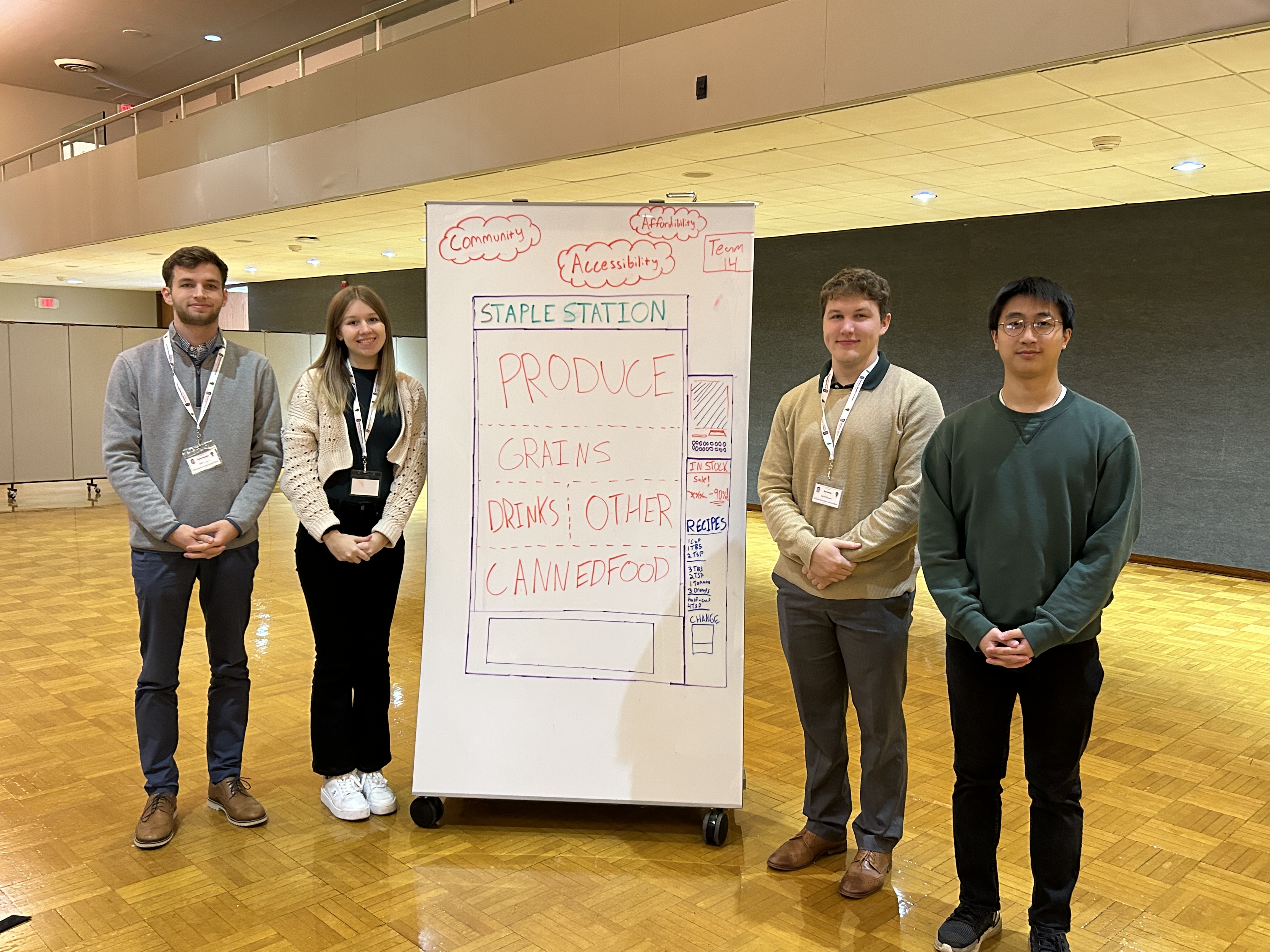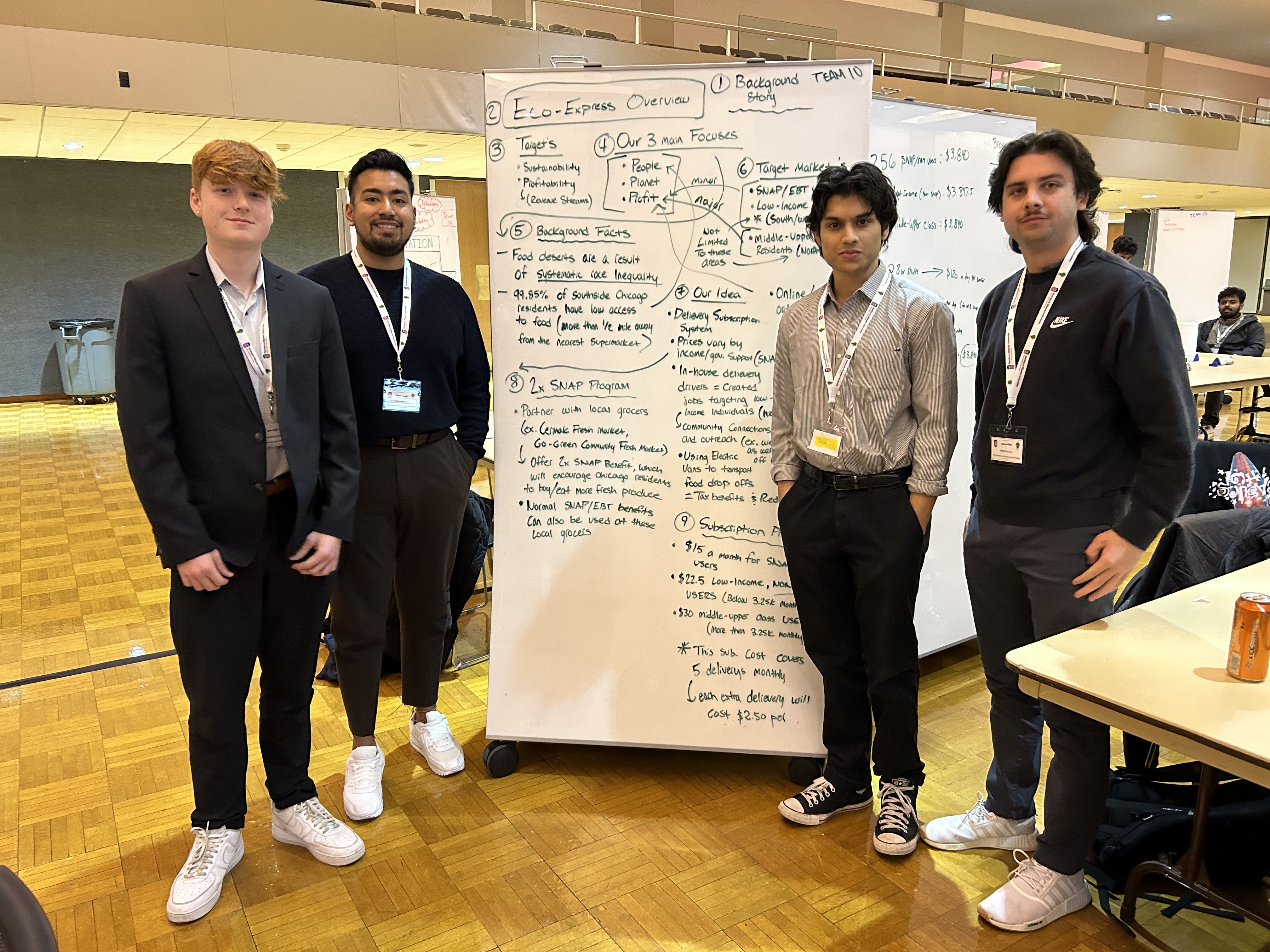
The first-place team, including Ellie Miller (second from left) Driehaus students took away first and third prize at the Food Systems Innovation Challenge, a 24-hour hackathon held at Northern Illinois University on November 11-12.
The first-place team was awarded $3,000 for their concept of using vending machines to bring low- or no-cost fresh food to food deserts.
The third-place team won $1,000 for a food delivery initiative that would partner with community grocers, farmers’ markets and other food programs to deliver fresh food to those enrolled in SNAP and EBT — and provide comprehensive support to delivery recipients.
The hackathon brought together teams of students from universities across the Midwest. Over the course of just 24 hours, each team was tasked with developing an innovative approach to expanding access to fresh food.
With guidance from experienced mentors – including the founder of a food access nonprofit – students had to strike a balance between innovation and practicality. They had to find a way to craft a meaningful solution to a multifaceted social justice issue – and make that solution sustainable as a business.
It was a tall order, to say the least. But it was also tailor-made for the core curriculum at Driehaus.
“My team [felt like] we had a cheat sheet for this,” said first-place winner Ellie Miller, an accountancy student. “Looking at all our class notes and assignments, ... we felt like we had started ahead of the game.”
That was by design. Miller and other competitors from Driehaus were all either enrolled in or had previously taken Business 103: Business for Social Good. As part of the core curriculum for the Bachelor of Science in business program, Business 103 integrates social good into students’ education early on in their time at Driehaus. Throughout the quarter, students learn how businesses can play a role in sustaining social good — and how prioritizing social impact, in turn, can create sustainable businesses.
“One of the things we were really passionate about” when designing Business 103, said Associate Professor of Marketing Melissa Markley, who leads the Business 103 instructional team, “was connecting students with the content, but also taking that content and saying: here's where you can try it out.”
The Food Systems Innovation Challenge was one such opportunity. The teaching team, Markley said, crafted fall-quarter Business 103 classes around food justice precisely so that students could compete in the hackathon. Future quarters will have similar focal points. Winter-quarter students will focus on sustainability in order to prepare to participate in the Hale Sustainability Conference, hosted by the Coleman Entrepreneurship Center. Spring-quarter classes will focus on B Corps, which are for-profit companies that build social impact into their mission.
For the fall-quarter students who participated in the hackathon, meanwhile, the journey is just beginning.
 The third-place team, including Lukas Taylor (left) and Daniel Salgado (second from left)
The third-place team, including Lukas Taylor (left) and Daniel Salgado (second from left)Da
niel Salgado, a member of the third-place team and a junior transfer student studying Human Resource Management at Driehaus, said that the competition inspired him to get more involved. “This was the first experience I had getting involved” outside the classroom since transferring, he said. “It’s definitely going to propel me to get more involved in other situations.”
“Everyone in my team is really invested and wants to keep working on this idea,” echoed Miller. “It’s been a great experience to connect with other students at DePaul who are interested in the same values. And now we get to work together on this throughout the next quarters.”
“You have the real possibility of taking this further,” Markley said. One example? The annual Purpose Pitch competition hosted by the Coleman Entrepreneurship Center, which awards thousands to business ideas with a significant social impact.
“There are people in that room with their checkbooks out ready to help fund this,” Markley continued. “And there are mentors there to help you get it started. These are people who’ve done it before and want to get involved. They’re just waiting for students to come with an idea.”